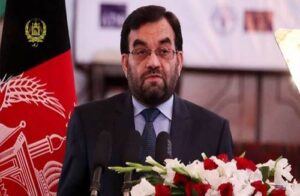
KABUL (SW): A new study has hailed the foreign policy regime of the current government as much more successful than that of the previous government.
Findings of this study by the Afghanistan Freedom House (AFH) on foreign policy, situation of war and peace, economic infrastructure development and performance of the current government compared to the previous one were made public here on Saturday.
The study indicated that 42 percent of citizens believed the current government’s foreign policy is much better than the one under the former president Hamid Karzai. However, 32 percent respondents said the current government has not performed well in combating corruption. Merit based appointments were viewed positively by 36 percent respondents.
Sayed Rohullah Rezwani, senior researcher at the AFH, unveiled findings of the survey. On the topic of war and peace, he said 77 percent of the people thought the Afghan National Security Forces (ANSF) are effective in fighting the insurgents. 45 percent of the people said they are not optimistic about the peace deal with the Hezb-i-Islami.
The survey indicated people are content with the National Unity Government (NUG)’s relations with the Islamic countries. 55 percent respondents viewed relations with the European countries effective, and 61 percent pronounced relations with the United States as successful. 63 percent of the respondents said securing ties with Pakistan was meaningless. 41 percent were optimistic about the government’s ties with Iran. 18 percent were in favor of good ties with India, 66 percent backed ties with China and 41 percent viewed ties with Russia positively.
A large percentage of people expressed optimism over the economic infrastructure development such as construction of commercial routes, attracting private investments, development of the Salma Dam, and securing foreign funds at the Brussels Conference 2016.
As many as 3011 individuals in Kabul, Balkh, Herat, Kandahar, Bamyan and Jalalabad provinces were consulted for this study.
ENDS





